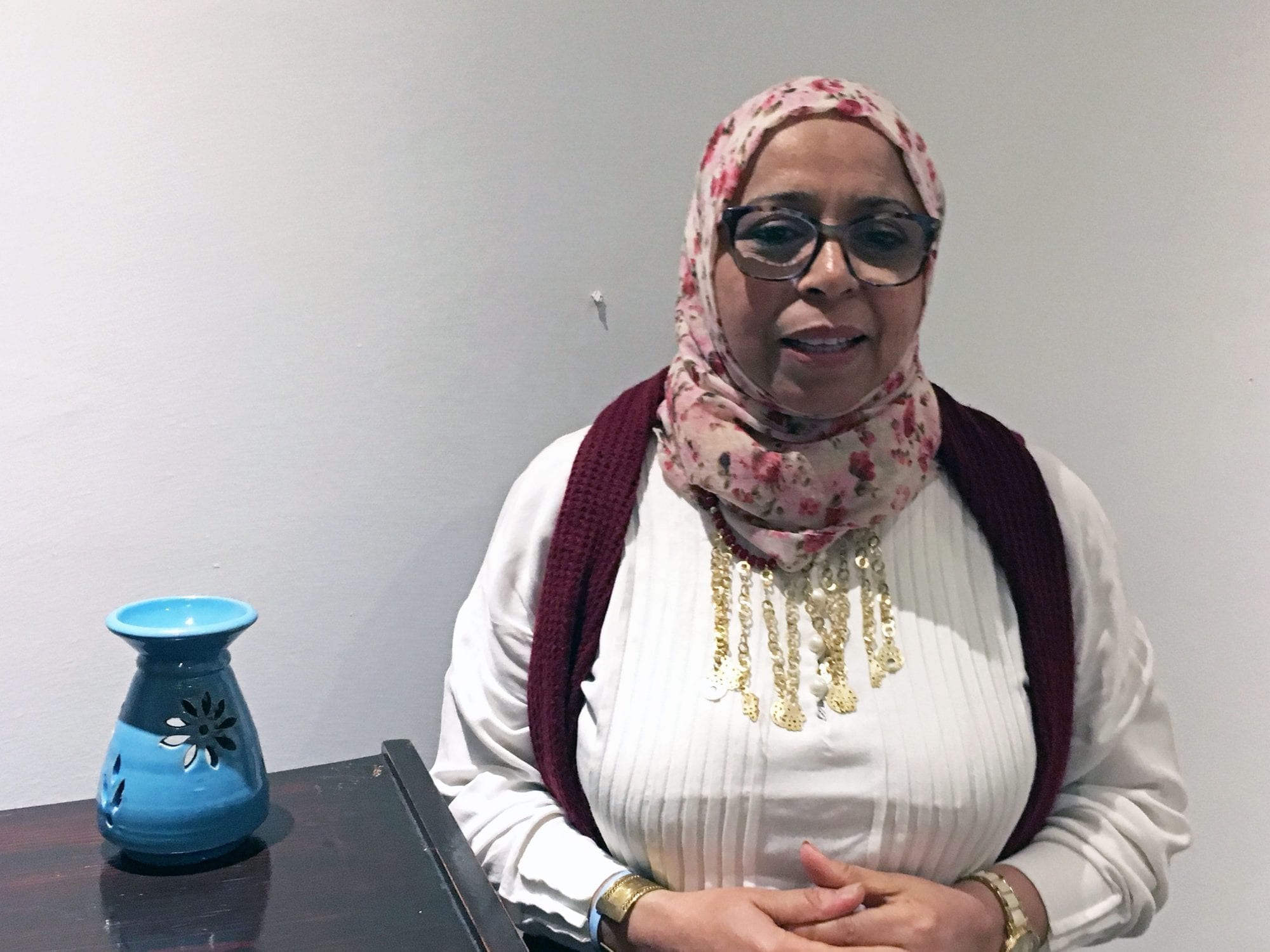
Jun 1, 2018
In Tunisia’s southern Gafsa region, Naziha Kdimi, a higher education teacher, struggled for years to gain acceptance among her male union peers.
This year, Kdimi was elected assistant general secretary for a regional union body covering the area for the General Union of Tunisian Workers (UGTT)—the first woman to hold an executive position in the region.
In this video clip, Kdimi encourages union women everywhere to never give up the struggle for gender equality.
Her advice to women seeking to change male-dominated cultures that have long inhibited women from exerting leadership: Keep showing up every day. Eventually, the men will accept you. Don’t go away, because then they will have won.
The video featuring Kdimi is part of the Solidarity Center Workers Equality Forum, where working people around the world describe their challenges, successes, and hopes and dreams for a better world for all workers.
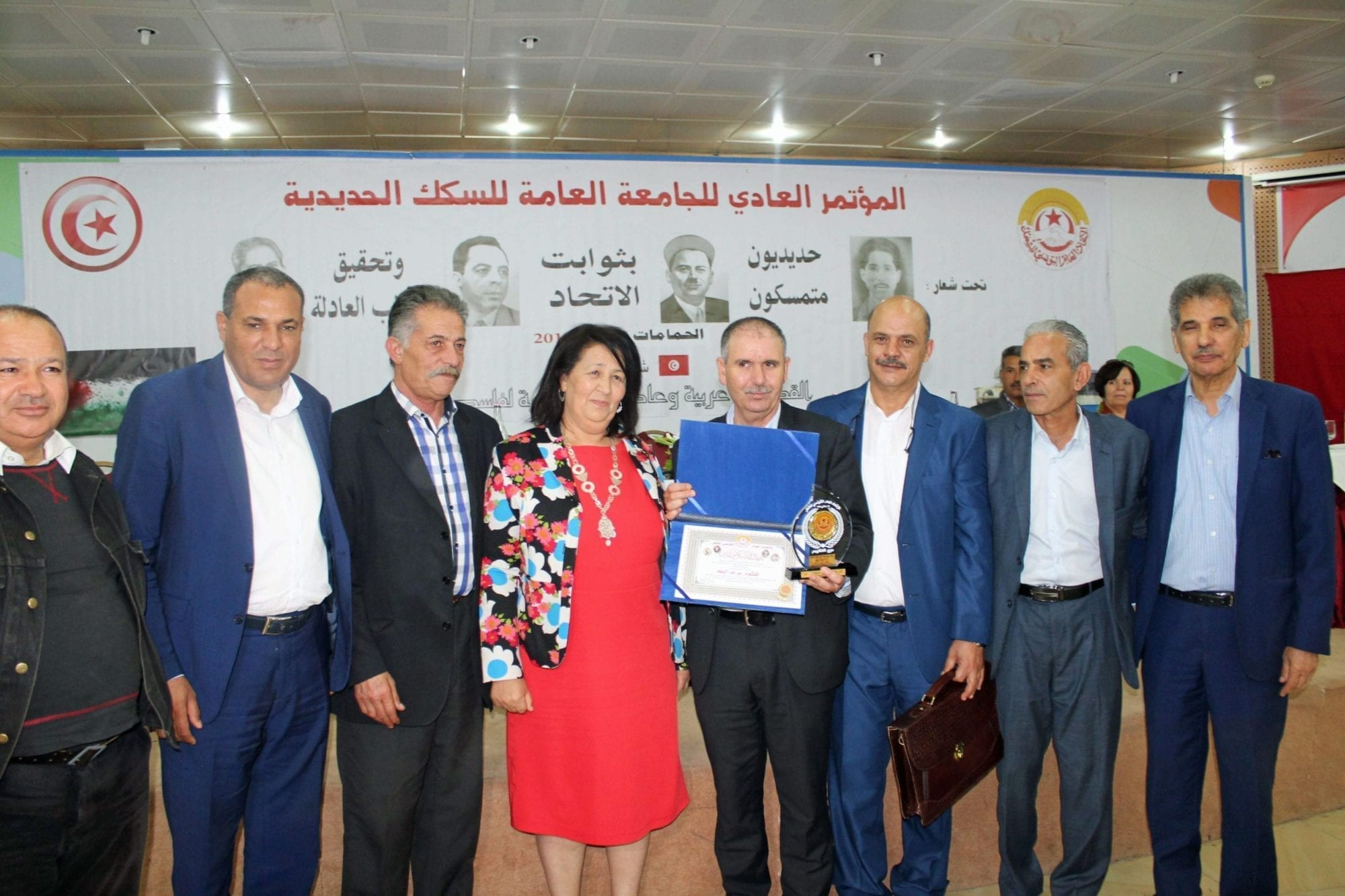
May 9, 2018
Kalthoum Barkallah, Solidarity Center senior program officer and master trainer in Tunisia, this week received a lifetime achievement award from the General Union of Tunisian Workers (UGTT). The award, the nationwide union’s highest honor, is given to union activists for their dedication to union work and in recognition of their struggle in the defense of workers and human rights.
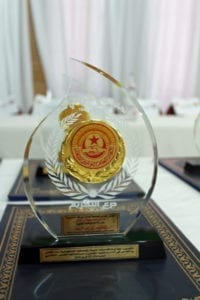
The UGTT award is the union’s highest honor.
“We are enormously proud of Kalthoum and the great contribution she brings to the labor movement through her incredible dedication and accomplishments,” says Hind Cherrouk, Solidarity Center country program director for the Maghreb region. “Kalthoum’s expertise in nurturing and training new generations of leaders, especially women unionists, has ensured the labor movement in Tunisia and beyond is served by new, skilled union activists.”
Presented by UGTT General Secretary Noureddine Tabboubi, the award reads: “Honoring sister and union activist Kalthoum Barkallah in appreciation for her dedication and perseverance in support for union work.”
In conferring the award, Taboubbi noted Kalthoum’s popularity among the UGTT’s union structures from local to national.
“When I began the struggle for democracy, freedom and the rights of women in 1979, I never for a moment imagined that there would be a day when I would be recognized or honored for my part in realizing these noble objectives,” says Barkallah.
Building Women’s Leadership in Their Unions
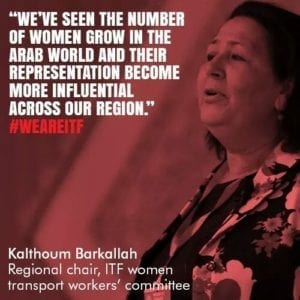 As an activist with the Tunisian General Federation of Railways, Barkallah was first elected as a deputy general secretary in 1983, heading up training within the union. She later was elected deputy general secretary in charge of international relations. In the railways industry, Barkallah was known as the “iron lady” for her determination and struggle to challenge her male colleagues in a male-dominated sector to achieve equality and justice for all.
As an activist with the Tunisian General Federation of Railways, Barkallah was first elected as a deputy general secretary in 1983, heading up training within the union. She later was elected deputy general secretary in charge of international relations. In the railways industry, Barkallah was known as the “iron lady” for her determination and struggle to challenge her male colleagues in a male-dominated sector to achieve equality and justice for all.
As an active union leader with the UGTT, Barkallah built on the gender empowerment training she began in the railway sector to reach union members in a variety of industries throughout Tunisia, championing women’s rights there and supporting her sisters beyond its borders.
Barkallah, who in 2006 was elected president of the International Transport Workers’ Federation (ITF)–Arab Women’s committee, also recently received an award from the ITF Women’s Committee for her fight and struggle in support of women workers in the transport sector.
Throughout her decades of service to workers and their unions, Barkallah balanced both work and family duties, raising two sons who each now have their own children.
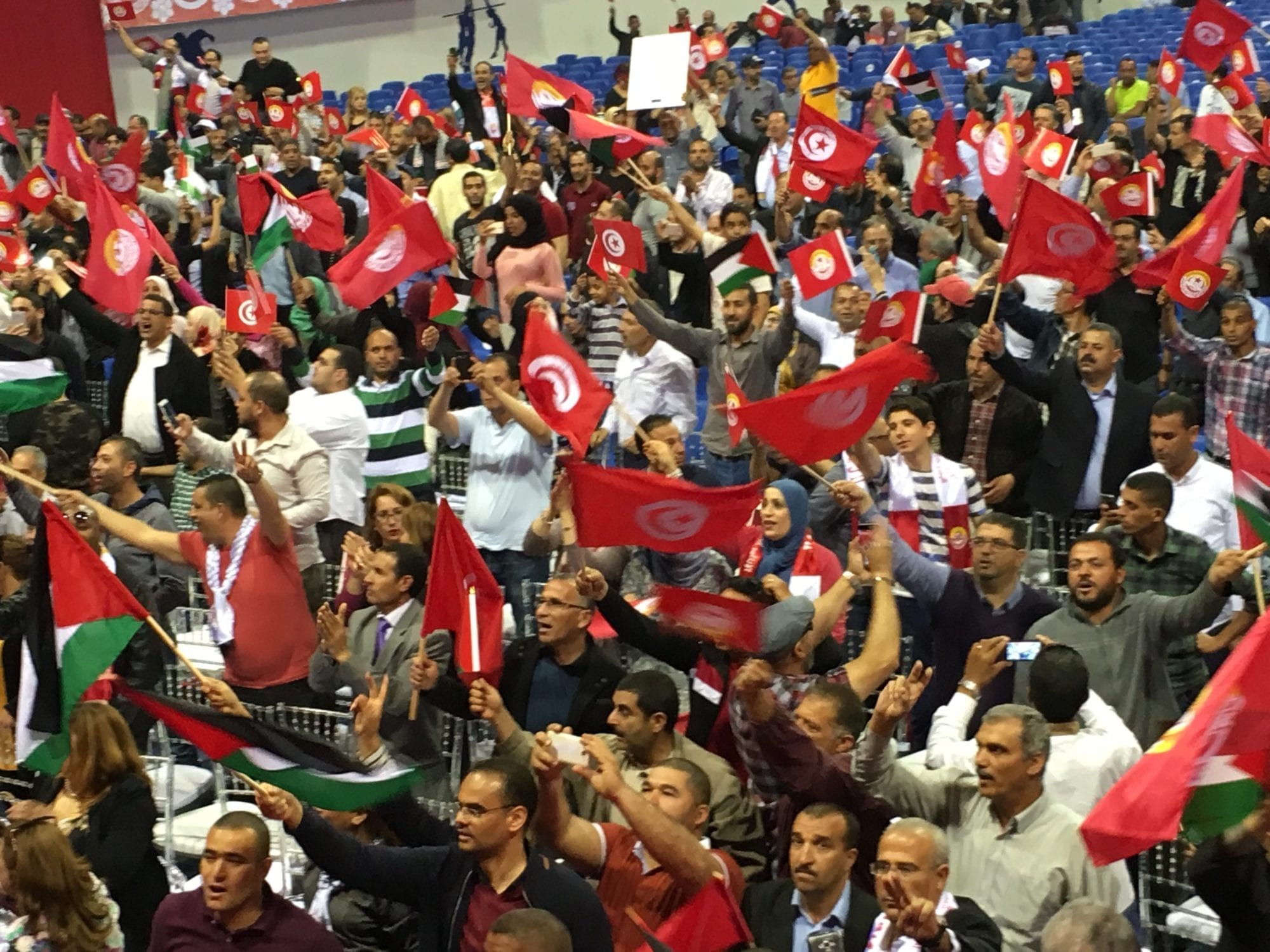
May 1, 2018
Chanting support for their union and for worker rights, more than 7,000 members of the General Union of Tunisian Workers (UGTT) packed the Menzah Sports Palace in Tunis today in a boisterous, enthusiastic May Day celebration.

“We are committed to defend worker rights and workers’ interests and we shall struggle for more justice, equality and freedom”–UGTT Secretary-General Noureddine Tabboubi Credit: Solidarity Center/Tula Connell
“Our principles are to defend the independence of this country and to defend the people of this country,” said UGTT Secretary-General Noureddine Tabboubi. “We are committed to defend worker rights and workers’ interests and we shall struggle for more justice, equality and freedom. We shall combat all forms of abuse and oppresssion.”
In a speech interrupted frequently by chants of “Long live UGTT” and “With blood and with spirit we remain loyal to the UGTT,” Tabboubi outlined the union’s efforts to work with the government in reforming public services without resorting to privatization, a move the union says would lower wages and create precarious jobs and reduce or eliminate access to pensions and health care.

“The UGTT’s priority is for the national interest”–UGTT member Dhouha Kouki Credit: Solidarity Center/Tula Connell
UGTT has been the leading force in protecting democratic gains following the 2011 Tunisian uprising in which workers, outraged at high unemployment and low wages despite the country’s economic prosperity, ousted Tunisia’s dictator, Zine el-Abidine Ben Ali. During the ensuring interim government, UGTT proposed a constitution that included the freedom to form unions and strike, proposals that were maintained when the new constitution was approved.
“In the light of the weakness of the different goverments, the UGTT remained the only reasonable power that ensured stability, but it also ensured a balance between workers and the government,” says Dhouha Kouki, a call center worker and UGTT member who took part in the May Day celebration. “UGTT’s priority is for the national interest.”
As workers waved Tunisan and UGTT flags, some wearing shirts imprinted with the demands of the 2011 uprising–“Employment, Freedom, National Dignity”–Taboubi said: “The goals of our revolution shall be achieved and nobody can confiscate our right to freedom, dignity and social justice.”
Economy Teeters on Crisis

A UGTT member holds a sign reading, “I am a trade unionist and I defend my country and my fellow citizens’ institutions.” Credit: Solidarity Center/Tula Connell
With 750,000 members across Tunisia, UGTT represents mineworkers, textile workers, professional employees and many others, including 75 percent of public-sector employees. The union federation has organized 250,000 members since the 2011 uprising, many of whom were formerly subcontracted government employees with low wages, no access to social benefits or secure employment. UGTT worked with the interim government within a month of the revolution to bring subcontracted workers into full-time employment, says Sami Tahri, secretary-general in charge of information.
Since then, the UGTT, a Solidarity Center partner, negotiated a 6 percent wage increase for private-sector workers in 2012, an 11 percent increase in the mininum wage in 2014, and an improved contract for high school teachers in 2015, according to “Workers and Thieves: Labor Movements and Popular Uprisings in Tunisia and Egypt.”
Yet the increasing number of workers in the informal sector–which represents more than 54 percent of the country’s gross domestic product–lack of investment in job creation, especially by financial institutions, and an official unemployment rate of 16 percent, including 250,000 university graduates in a country of 11.6 million, mean Tunisia is facing an economic crisis, says Tahri.
Workers in the informal economy are “deprived of all their economic rights and have no social protection like paid sick leave or pensions,” he says, speaking through a translator. Tahri says the official unemployment rate is likely much higher because many people are not counted.
Retirees are suffering the most, especially those who worked for private employers, Tahri says. Many private-sector employers do not fully pay into the country’s social security system, resulting in pensions so low that 25 percent of retirees receive less than the minimum wage, and another 30 percent receive only the minimum wage, says Tahri.
Creating a ‘Solidarity Economy’
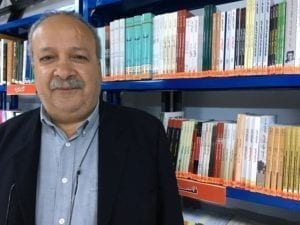
Sami Tahri, UGTT Secretary General in charge of Communications, says UGTT is assisting workers through multiple strategies. Credit: Solidarity Center/Tula Connell
The UGTT is tackling the challenges facing Tunisian workers through organizing and legislative action. In partnership with allied organizations, including the Solidarity Center, UGTT is organizing rural workers in Tunisia’s long-neglected interior, where most of the 1.5 million agricultural workers are women who are not covered by social benefits like pensions and who toil in dangerous and harsh conditions, often into their seventies.
The UGTT also submitted legislation to the national parliament that would create a “solidarity economy” in which the government finances young workers, especially those in agriculture, service and handicrafts, to create their own “start-ups,” with part of the profits returning to the government to fund more new enterprises. By targeting workers in the informal economy, the program also would bring more workers into the social security system, which also is underfunded because there are now five retirees for every one worker. In the 1970s, Tahri says, the ratio was reversed.
Additionally, UGTT has reformed internal union structures to reflect women workers, who comprise the majority of workers in industries such as education, health care and auto parts manufacturing. In 2017, the UGTT Executive Board voted to require executive boards at all levels of the union to include at least two women and better represent its membership.
In 2013, the UGTT was instrumental in brokering a peaceful path to democracy as part of the Tunisian “Quartet,” which was awarded the 2015 Nobel Peace Prize.
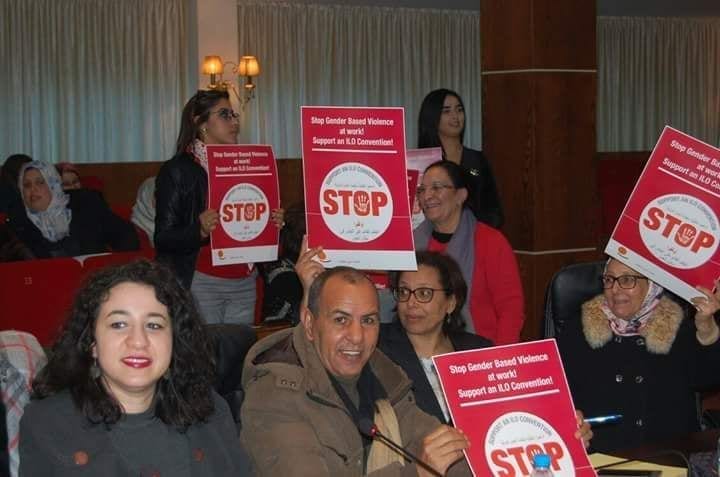
Mar 8, 2018
Women union activists and their allies in Morocco and Tunisia celebrated International Women’s Day this week with events that highlighted the need for a global standard to address gender-based (GBV) violence at work.
“Violence is escalating dramatically. Without an international agreement and deterrent laws that protect women at home, in society and in workplaces, we cannot move forward,” says Saida Ouaid, a member of the Executive Office of the Democratic Confederation of Labor (CDT) in Morocco.
Ouaid and other women union leaders and allies took part in a March 6 event “Toward an International Convention for the Elimination of Gender-Based Violence in the Workplace” at the Parliament in Rabat, in coordination with Morocco’s Secretariat of Equity and Equality.
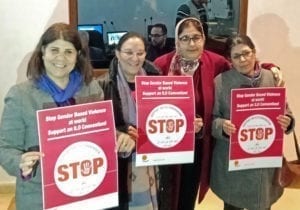
Touriya Lahrech (far left),coordinator of the CDT’s Women Department, joins women union members to discuss an ILO convention addressing gender-based violence at work. Credit: Mohamed Yakkane
The International Labor Organization (ILO) is considering a convention (regulation) that would address violence and harassment against workers. The Solidarity Center is part of an International Trade Union Confederation (ITUC) campaign for passage of a strong ILO convention.
In Tunisia, 100 union members from across the country gathered for a March 8 event where they also discussed the need for passage of an ILO convention on gender-based violence at work.
“The gathering is an opportunity for women to stand up for their struggles to defend their rights and freedom, and to promote equality and an environment free of violence,” Samir Al-Shefi, deputy general-secretary of the General Union of Tunisian Workers (UGTT) Women, Youth and Association, said in opening the event.
Naima Hammami, one of two women on the UGTT’s executive office, paid tribute to the struggles of Tunisian, Palestinian, Syrian and Arab women around the world. The event was sponsored by UGTT’s Women, Youth and Association Department, together with the Solidarity Center.
Gender-Based Violence ‘Widespread at Work’
At both the Morocco and Tunisia events, experts discussed preliminary findings on gender-based violence at work based on participatory field research sponsored by the Solidarity Center and CDT in Morocco and the UGTT in Tunisia.
Discussing the research in Morocco, Najat Al-Razi, a gender specialist and sociologist, says gender-based violence is “widespread in the world of work,” and “the most common form of violence against women in workplaces is sexual harassment.”
Asma al-Marani, a member of the Moroccan Union of Labor and the Arab Trade Union Confederation, pointed out that her union receives daily complaints about violence at work from women working in the precarious and informal economy.
CDT leaders noted that as part of the global campaign for an international convention on the elimination of violence in the world of work, the union will continue meeting with a range of allies at the grassroots level until the Geneva Conference with a campaign to push the government to support the ILO draft convention, supplemented by a guiding document implementing the convention.
Representatives from the Njda Center, the Jusour Association, the Women’s Labor Union, the Association of Women for Equality and Democracy (Afed) and other union leaders and journalists also took part in the Rabat event.
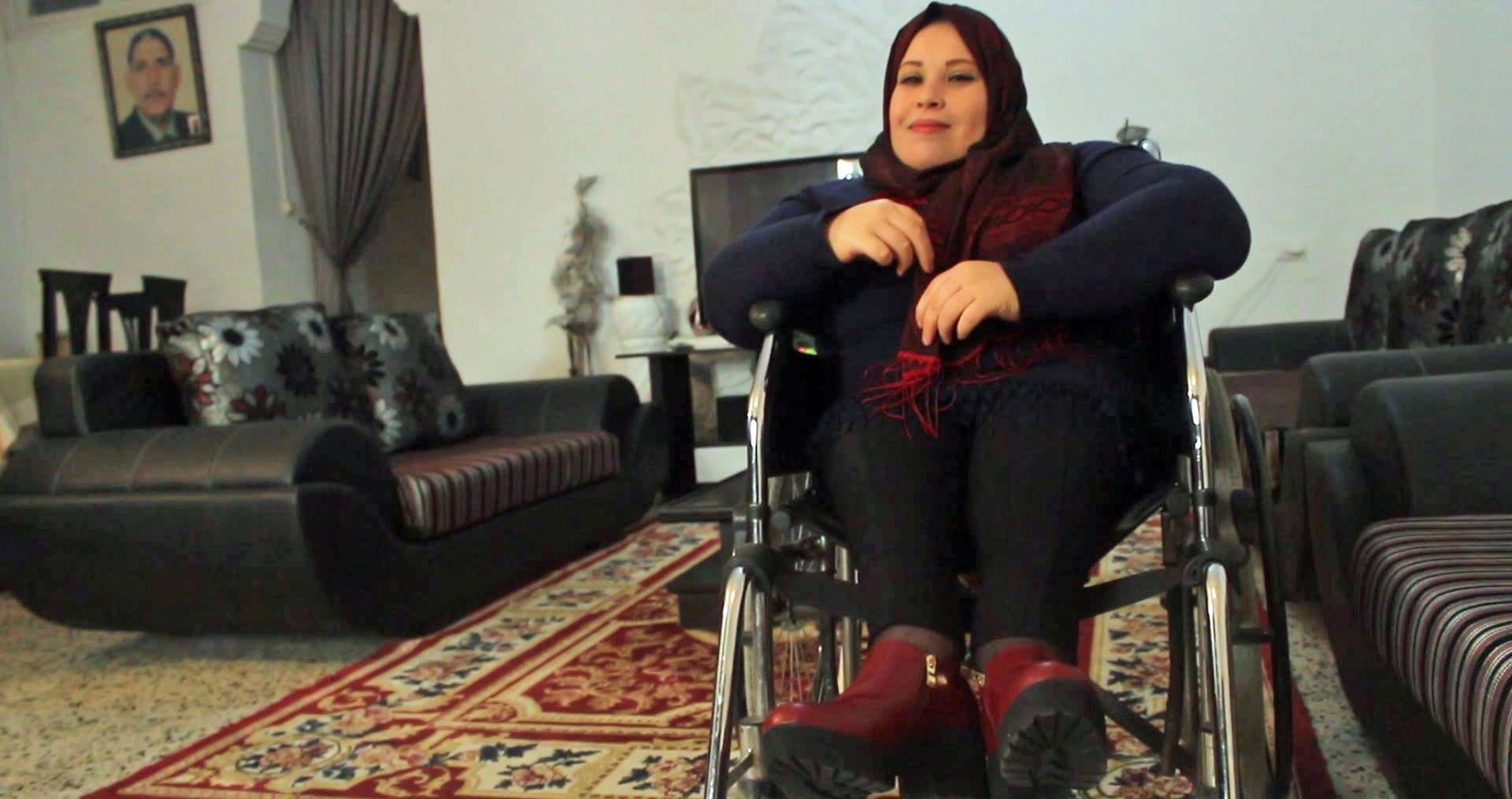
Jul 31, 2017
Sana Sabheni, 32, is confined to a wheelchair at her home in a four-story apartment complex in Tunisia. She does not leave her apartment for months at a time because her building does not have an elevator. Without resources to enable her mobility, Sabheni, who lives with her elderly mother, must crawl down two flights of stairs to reach street level. From there, she depends upon someone to carry her wheelchair down to her and push her through the streets. Lacking basic provisions for accessibility, she is unable to hold a good job or engage in everyday life.
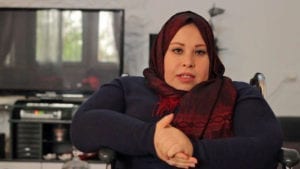
Through Solidarity Center assistance, Sabheni now has an electric wheelchair and the possibility of employment. Credit: Houcem Manai
Sabheni was among 1,601 participants in Solidarity Center surveys among workers with disabilities in Morocco and Tunisia. Conducted in partnership with Union Marocaine du Travail (UMT), Union Generales des Travailleurs Tunisiens (UGTT), and the Arab Forum for the Rights of Persons with Disabilities, the surveys are the first of their kind to examine how workers with disabilities and unions can address discrimination and lack of accessibility for workers in North Africa. The experiences of Sabheni and other workers with disabilities reveal how a powerful combination of discrimination, lack of appropriate accommodation and poor enforcement of existing laws deprives persons with disabilities of good jobs.
While the World Health Organization (WHO) reports that persons with disabilities account for 15 percent of the global population, in the Arab world unemployment rates for persons with disabilities can be as high as 90 percent. The Solidarity Center studies find that efforts to improve employment among persons with disabilities focus on “make-work” programs that rely on local charities rather than address accessibility. As a result, workers with disabilities often are marginalized into informal economy jobs with little access to workplace rights through unions.
Although legislation in both Morocco and Tunisia establishes hiring quotas for persons with disabilities, the surveys’ results suggest most private-sector employers pay little heed to this law and labor inspections have proven inadequate in forcing compliance.
Women with Disabilities also Challenged by Sexism
Sabheni now has an electric wheelchair and the promise of employment, the result of Solidarity Center partners’ support with support from Lilia Makhlouf from the Ministry of Employment and Vocational Training, and the generosity of a local businesswoman. Sabheni must still manage two flights of stairs on her own but once at the lower level of her building, she is able to access her new wheelchair and independent life outside her building.
Yet most persons with disabilities in North Africa will face immense obstacles to finding good jobs. In particular, women with disabilities are challenged by the double burden of sexism and ableism. For North African women, sexual harassment, violence, and other forms of abuse mean job opportunities can be both scarce and exploitative.
Reflecting on survey results, Nahla Sayadi, coordinator of the Women’s Committee in Monastir, Tunisia, and a member of the UGTT, summarized the dire conditions facing women with disabilities at work, in both Tunisia and Morocco.
“Even within the category of workers with disabilities, men have significantly better conditions than women,” she said “The rate of sexual harassment is shocking. Women with disabilities at work are subjected to exploitation—as workers, as disabled, and especially as women—three times as often.”
Unions the Strongest Voices for Rights of Workers with Disabilities
Sayadi touches on an important aspect of the struggle for disability rights at work. As an issue that is at once invisible and highly intersectional, disability rights can be a difficult subject around which to help workers form unions. Workers with disabilities may feel particularly beholden to their employers or otherwise fear reprisal, leaving them reluctant to speak out for their rights. By working alongside civil society groups, rights activists, and union leaders to complete these landmark studies, the Solidarity Center assembled a strong coalition committed to supporting workers with disabilities.
“[The study] has given me a lot of energy to continue my struggle as a trade unionist and activist,” Sayadi concluded.
The ILO reported in a recent review that labor unions are already the strongest voices advocating for the rights of persons with disabilities at work around the world. Public-sector unions, where survey data shows persons with disabilities experience higher levels of union representation and are natural organizers around rights issues because of their position at the nexus of governance and work. Armed with unprecedented data on the subject, union allies are now better prepared to fulfill this role across North Africa.
Following the studies, which were funded by the Ford Foundation, 13 workers with disabilities contacted the UMT in Morocco to learn more about the union and their rights as workers. In Tunisia, the study brought 82 workers with disabilities into the UGTT. Working with a regional labor movement committed to building inclusivity, the Solidarity Center is empowering persons with disabilities to exercise their rights as workers in a region where they face dynamic challenges to finding decent work.




 As an activist with the Tunisian General Federation of Railways, Barkallah was first elected as a deputy general secretary in 1983, heading up training within the union. She later was elected deputy general secretary in charge of international relations. In the railways industry, Barkallah was known as the “iron lady” for her determination and struggle to challenge her male colleagues in a male-dominated sector to achieve equality and justice for all.
As an activist with the Tunisian General Federation of Railways, Barkallah was first elected as a deputy general secretary in 1983, heading up training within the union. She later was elected deputy general secretary in charge of international relations. In the railways industry, Barkallah was known as the “iron lady” for her determination and struggle to challenge her male colleagues in a male-dominated sector to achieve equality and justice for all.







